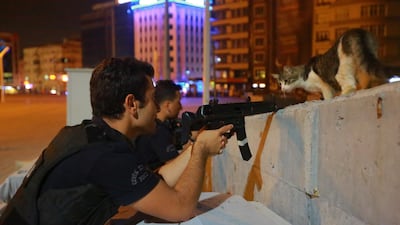I walked towards the customs desk, sweating. Near the exit, a security officer stood with a very visible firearm.
I was at the now-defunct Ataturk International Airport in Istanbul, moving to the city from Beirut. And I was carrying two cats.
They were both rescue cats from Beirut for the Ethical Treatment of Animals, a shelter in the city’s suburbs. They tell you that you never get to pick your cat – she picks you. It is true.
I walked into the shelter and a delightful white one with black spots immediately climbed on my shoulder. A shy orange tabby with a distinctive meow crawled under my feet, looked up, decided I would do and settled down for a nap. These two cats had picked me.
They became Issam and Vita – Issam because I thought it would be funny if he was given an inconspicuous Arab name, and Vita was the name of my then-fiancée-now-wife’s favourite pastry shop in her hometown of Aleppo.
The cats became family, part of what made home, wherever we were. They kept me company as I stayed up late at night working on my master’s thesis. They rushed to the door to meet me when I got home from work in the evening. Running around on the rooftop with them got my mind off the stories I was covering as a journalist. They seemed to know when I was sad, curling up in my lap when I needed it.
One time, while I was moving houses, my fiancée looked up from the suitcases that were strewn all over the apartment. Her eyes widened and she yelled, “Where are the kids?!” She was talking, of course, about the cats.
So, when we were moving to Istanbul, it was only natural that we would take them along. Vaccines, blood tests, microchip, up-to-date cat passport and other paperwork.
I still worried I might be missing something, even as the plane touched down and I walked up to the customs officer.
He looked up at me as I approached. I told him I had two cats, and held out a folder with their papers. He asked me what I wanted him to do. I asked if he needed to look at their papers. He laughed, ushering me along. This was Istanbul, he said. The gun-toting security officer kneeled to play with the cats.
Istanbul, as one Wall Street Journal article declared back in 2015, should really be called Catstantinople. One apocryphal story from the city's history tells of an Ottoman sultan who, eager to please a European delegation and show them how civilised Istanbul was, carted off street animals to a nearby island. Their howls kept residents across the shore up through the night, and the Turkish animal rights movement was born.
Whatever the origin of the affinity was, Istanbullus, as the city’s denizens are known, adore cats. For all the political horse races that take place to dominate the city’s neighbourhoods, it often feels in Istanbul as though it is the felines who really run the show.
Most shops have a bowl of kibble and water for strays living in the area. Near our home, a short walk from the Galata tower, many of our neighbours had built little wooden houses in which local cats could shelter during the winter. I interviewed a little girl who played music near Taksim square to collect money for cat houses, and an imam who became a viral sensation after he opened up his mosque to local strays to sleep in when it rained or snowed.
Even the Hagia Sophia has a cat mascot called Gil.
Cats appeared to congregate with some regularity in the vicinity of our house, fed by a septuagenarian called Leila who gathered donations from the block. These cats appeared to be led by a fat, majestic long-hair who slept in the local leather goods shop, languidly stretching and staring disdainfully at the tourists who stopped by to snap photos of him, but nevertheless posing behind the glass storefront. He was called Selim, after a sultan who routinely executed his viziers.
Issam and Vita fit right in. They spent most days on our balcony, staring out at the Bosphorus, sunbathing and chasing off seagulls who dared to venture too close.
When it eventually came time for us to pack up for Canada, we repeated the whole process again. The cats had to go in their carriers in cargo, so I tipped the baggage handler twice. We worried about them throughout the ten-hour flight. When we landed and picked them up, they chirped and meowed. A customs officer let us through faster when he saw them.
The cats kept us warm those first few nights, and throughout our first Canadian winter. Vita seemed to know that something was different when my wife was pregnant, curling up and resting against her baby bump.
Now the cats and our 10-month old child are endlessly fascinated by each other. I hope his experiences with our cats will teach my son what it means to be gentle and kind, to care for someone else.
At least, that’s what they have taught me. There’s nothing like reading a first draft of your masterpiece to a cat, who promptly turns around and walks away, to keep your ego in check.
Kareem Shaheen is a former Middle East correspondent based in Canada


